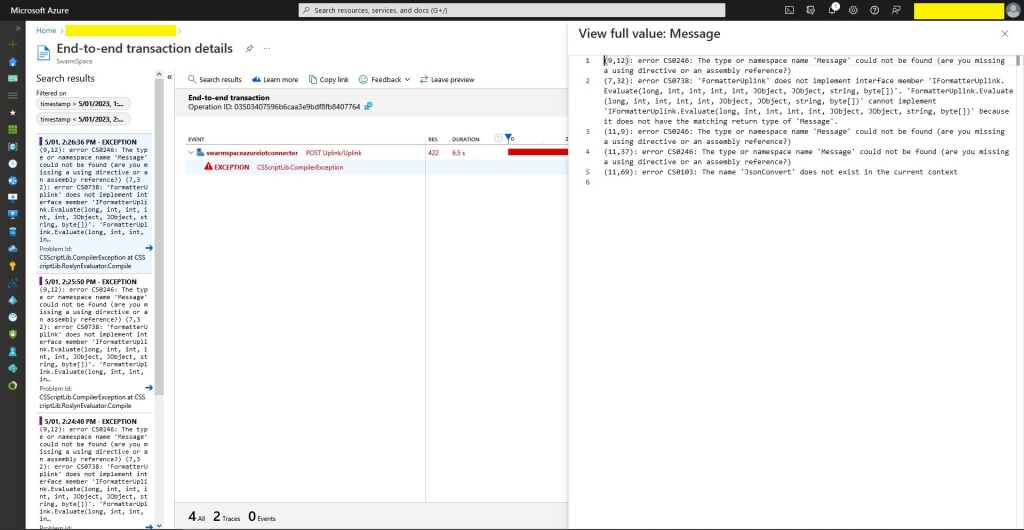The approach used in Swarm Space–Uplink Payload Message Creation Time had significant limitations e.g. setting the iothub-creation-time-utc message property.
public interface IFormatterUplink
{
public Message Evaluate(int organisationId, int deviceId, int deviceType, int userApplicationId, JObject telemetryEvent, JObject payloadJson, string payloadText, byte[] payloadBytes);
}
Uplink payload formatters now return a Microsoft.Azure.Azure.Devices.Client message object to the UplinkController.
...
JObject telemetryEvent = new JObject
{
{ "packetId", payload.PacketId},
{ "deviceType" , payload.DeviceType},
{ "DeviceID", payload.DeviceId },
{ "organizationId", payload.OrganizationId },
{ "UserApplicationId", payload.UserApplicationId},
{ "ReceivedAtUtc", payload.HiveRxTime.ToString("s", CultureInfo.InvariantCulture) },
{ "DataLength", payload.Len },
{ "Data", payload.Data },
{ "Status", payload.Status },
};
_logger.LogDebug("Uplink-DeviceId:{0} PacketId:{1} TelemetryEvent before:{0}", payload.DeviceId, payload.PacketId, JsonConvert.SerializeObject(telemetryEvent, Formatting.Indented));
using (Message ioTHubmessage = swarmSpaceFormatterUplink.Evaluate(payload.OrganizationId, payload.DeviceId, context.DeviceType, payload.UserApplicationId, telemetryEvent, payloadJson, payloadText, payloadBytes))
{
_logger.LogDebug("Uplink-DeviceId:{0} PacketId:{1} TelemetryEvent after:{0}", payload.DeviceId, payload.PacketId, JsonConvert.SerializeObject(telemetryEvent, Formatting.Indented));
ioTHubmessage.Properties.Add("PacketId", payload.PacketId.ToString());
ioTHubmessage.Properties.Add("OrganizationId", payload.OrganizationId.ToString());
ioTHubmessage.Properties.Add("UserApplicationId", payload.UserApplicationId.ToString());
ioTHubmessage.Properties.Add("DeviceId", payload.DeviceId.ToString());
ioTHubmessage.Properties.Add("deviceType", payload.DeviceType.ToString());
await deviceClient.SendEventAsync(ioTHubmessage);
_logger.LogInformation("Uplink-DeviceID:{deviceId} PacketId:{1} SendEventAsync success", payload.DeviceId, payload.PacketId);
}
...
The default uplink payload formatter (UserApplicationId 0.cs) returns a Microsoft.Azure.Azure.Devices.Client message object with a serialised TelemetryEvent payload.
public class FormatterUplink : PayloadFormatter.IFormatterUplink
{
public Message Evaluate(int organisationId, int deviceId, int deviceType, int userApplicationId, JObject telemetryEvent, JObject payloadJson, string payloadText, byte[] payloadBytes)
{
Message ioTHubmessage = new Message(Encoding.ASCII.GetBytes(JsonConvert.SerializeObject(telemetryEvent)));
return ioTHubmessage;
}
}
The Swarm Eval Kit uplink sample formatter (UserApplicationId 65535.cs) “unpacks” the uplink Javascript ObjectNotation(JSON) message, adds an Azure IoT Central compatible location to the TelemetryEvent and an “iothub-creation-time-utc” message property.
public class FormatterUplink : PayloadFormatter.IFormatterUplink
{
public Message Evaluate(int organisationId, int deviceId, int deviceType, int userApplicationId, JObject telemetryEvent, JObject payloadJson, string payloadText, byte[] payloadBytes)
{
if ((payloadText != "") && (payloadJson != null))
{
JObject location = new JObject();
location.Add("lat", payloadJson.GetValue("lt"));
location.Add("lon", payloadJson.GetValue("ln"));
location.Add("alt", payloadJson.GetValue("a"));
telemetryEvent.Add("DeviceLocation", location);
}
Message ioTHubmessage = new Message(Encoding.ASCII.GetBytes(JsonConvert.SerializeObject(telemetryEvent)));
ioTHubmessage.Properties.Add("iothub-creation-time-utc", DateTimeOffset.FromUnixTimeSeconds((long)payloadJson.GetValue("d")).ToString("s", CultureInfo.InvariantCulture));
return ioTHubmessage;
}
}
If the uplink formatter compilation or execution fails, a detailed exception message is logged to Azure Application Insights
I need to add some tools to make the creation, modification, deletion and debugging of downlink/uplink formatters easier.
